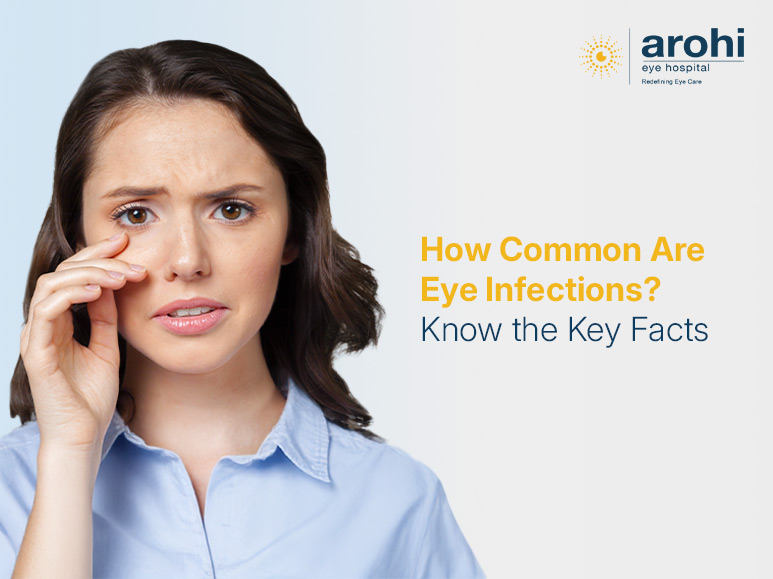Millions of humans around the globe suffer from eye infections every year. It can be as mild irritation to critical conditions, and such infections can easily interfere with day-to-day activities and even your vision if it is left untreated. It is, therefore, important to understand the causes, symptoms, and remedies for eye infections so that every time you experience them, you can seek immediate medical attention to preserve proper ocular health.
This article will give some insights into how common eye infections are, common types of eye infections, symptoms and signs, and the importance of seeking expert care. Let’s find out how to protect and keep your vision effectively.
A] Understanding Eye Infections
An eye infection is caused when harmful microorganisms, such as bacteria, viruses, or fungi, invade an eye. It could affect any part of the eye that may include parts such as cornea, conjunctiva, or eyelids. Some infections tend to be not so serious and can disappear on their own, but others can give rise to complicated problems such as scarring and loss of vision if not treated immediately.
Environmental factors, allergic reactions, and poor hygiene are the primary common causes of eye infections. A person who usually touches his/her eyes with unwashed hands or a person who uses old or infected makeup is more prone to infections. In addition, using the same towels, improper contact lens cleaning, or exposure to polluted environments may worsen the condition. Awareness of these triggers can minimise the risk of infections and maintain good eye health.
B] Common Types of Eye Infections
Knowing the common types of eye infections helps in early recognition and treatment. Each type has specific challenges and requires particular approaches for effective management.
1. Bacterial Conjunctivitis (Pink Eye)
- Causes and characteristics: Bacterial conjunctivitis is the type caused by Staphylococcus aureus or Streptococcus pneumoniae bacteria. This most of the time comes along with redness, swelling, and yellow or green discharge which can be thick in texture.
- Transmission methods: This infection is highly contagious. The common mode of transmission is direct contact with the hands, towels, or eye drops of the infected person. This infection spreads among people working in group settings such as schools or offices.
- Typical duration and contagiousness: Symptoms last from 7 to 10 days if it is treated. The condition can still be spread as long as the discharge does not stop coming. Ensure you maintain good hygiene, such as proper hand washing and avoiding sharing items, as this could restrict the recovery spread.
2. Viral Conjunctivitis
- Distinguishing features: Viral conjunctivitis typically presents with watery discharge, itching, and photophobia. Unlike bacterial conjunctivitis, it’s typically caused by adenoviruses.
- Common viral causes: This is the situation that results from a respiratory infection or contact with an infected person by a virus. Another factor that could be associated with an increased risk is seasonal allergic reactions.
- Prevention methods: To avoid viral conjunctivitis, one should avoid touching their eyes and wash their hands frequently as well as often sanitise the surroundings. Use protective eyewear in crowded places. If someone has recently faced a cold or flu, ensure to take extra precautions to avoid spreading the virus.
3. Fungal Eye Infections
- Risk factors: These infections are less common but can occur due to trauma involving plant material or contact with contaminated water. The risk factors mainly include people with a weakened immune system, farmers, and those working in humid environments.
- Less common but serious implications: Fungal eye infections can result in excessive complications like corneal ulcers or blindness if not treated on time. Fungal infections are not like bacterial or viral infections, as they develop slowly but can cause more damage in the long run.
- Treatment challenges: Diagnosis of fungal infection can be complicated as it involves special tests. Antifungal eye drops or oral medication is a treatment, and that, too, sometimes takes weeks or months to become effective. Timely intervention is vital to save you from irreversible damage.
C] Recognising Eye Infection Symptoms
Early diagnosis of signs and symptoms can help prevent complications of eye infections. The following are common eye infection symptoms:
- Redness and inflammation: Persistent redness and swelling are key indicators of infection.
- Discharge and crusting: Yellow, green, or clear discharge that crusts can signify bacterial infection.
- Pain and irritation: If one feels persistent pain in the eye, it should not be taken lightly. Irritation can also appear, as a gritty sensation as if something is stuck in the eye.
- Vision changes: There can be blurry or distorted vision, especially in more severe cases.
D] When to Seek Immediate Medical Attention
Most infections do resolve on their own, but some eye infection symptoms require immediate attention:
- Severe pain: Severe pain would be the initial symptom indicating critical conditions like a corneal ulcer or keratitis.
- Vision problems: Sudden loss of vision or severe blurriness should be immediately referred to the best eye hospital.
- Symptoms in infants: Newborns are especially at risk, and if any symptoms of infection are noted, they have to be addressed promptly to avoid developmental complications.
E] Why Professional Care is Essential?
Risks of Relying on Home Remedies
Warm compresses or saline rinses in the home are temporary solutions and do not completely treat the root cause of eye infections. Reliance on home remedies for eye infections may worsen the condition or lead to complications, including scarring or vision loss. For example, using unsterilised equipment or over-the-counter drops without a prescription may worsen the infection.
Benefits of Consulting an Eye Specialist
Eye professionals can diagnose infections accurately with the use of superior tools and tests. They can prescribe effective remedies, such as antibiotics, antivirals, or antifungals, tailored to the precise type of infection. For example, fungal infections require specialised care that over-the-counter solutions can not offer.
F] What to Expect From Professional Treatment?
The general course of eye care involves:
- Comprehensive examination with the help of specific diagnostic equipment.
- Specialised tests to determine the type of infection.
- Prescribed medicines.
- Eye exercises to improve vision to enhance overall eye function.
- Clear medication instructions and follow-up care.
- Progress monitoring.
- Adjustment in treatment based on the results.
G] Recovery Tips
To support healing and cure an eye infection symptoms:
- Take all the prescribed medicine.
- Avoid makeup and contact lens.
- Maintain proper hand hygiene.
- Change towels and washcloths every day.
- You can use artificial tears to lubricate your eyes.
- Avoid touching or rubbing your eyes.
- Ensure your environment is clean and free from dust.
Conclusion
Nowadays, people believe that eye infections are the most common, but remember that they can range from mild irritations or severe conditions that can cause a loss of vision if left untreated. Knowing in advance about their symptoms, their causes, and how common are eye infections can help you treat them on time. We have an eye hospital in Mumbai, we provide professional analysis and personalised remedies for eye infections to safeguard that precious vision of yours. With superior facilities and experienced professionals, we are dedicated to providing you with the best possible care for your eyes.
FAQs
1. What is the most serious eye infection?
Fungal keratitis and endophthalmitis are some of the most serious eye infections and must be treated right away.
2. What is the fastest way to cure an eye infection?
The fastest and safest way to recover from an eye infection is by visiting the best eye hospital and consulting an eye specialist for proper diagnosis and medication.
3. Is Hot Water Good For An Eye Infection?
Warm compresses are helpful in soothing symptoms but hot water is not recommended as it can further worsen the condition.
4. Can An Eye Infection Go Away Overnight?
Most infections take a few days to a week to improve with proper treatment; overnight healing is unlikely.
Dr. Shradha Goel
Dr. Shradha Goel, Chief Surgeon at Arohi Eye Hospital, is a renowned Phaco-LASIK surgeon with over 10,000 surgeries to her credit. She earned her MBBS from Grant Medical College, Mumbai, and a Master’s in Ophthalmology from Kasturba Medical College, Manipal. As a member of the American Academy of Ophthalmology, Dr. Goel specialises in LASIK, refractive errors, and cataract treatments.


